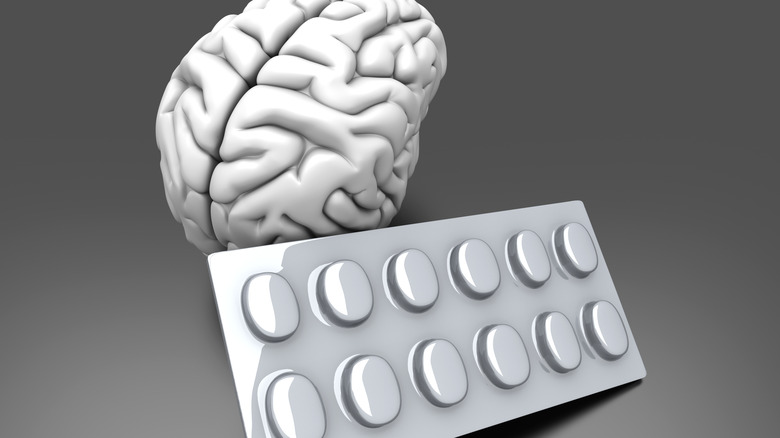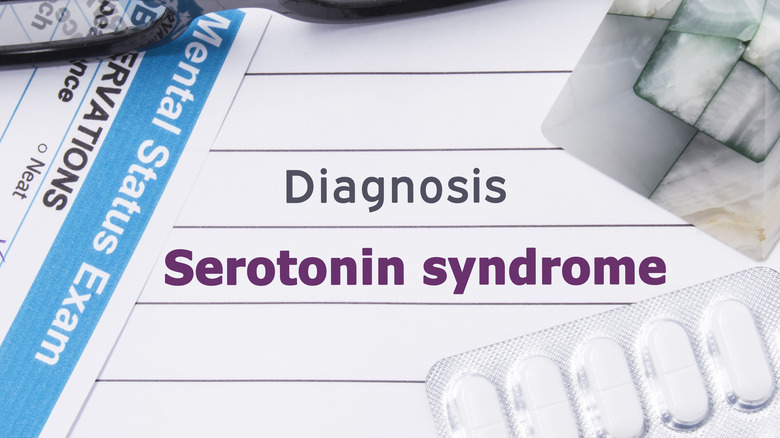For thousands of individuals, living with depression or depressive symptoms is a part of daily life. Johns Hopkins Medicine states that each year, up to 26% of American adults experience a diagnosable mental health condition, with 9.5% of American adults experiencing a depressive illness. Depression symptoms can become so severe that they can cause major disruptions in personal and professional life activities. However, for those living with depression and depressive symptoms, there is hope for relief and emotional balance. WebMD explains that 80-90% of individuals who receive treatment for their depression and depressive symptoms will experience relief.
Therapy and medication are the most common elements of a treatment program for depression. When receiving medical treatment for depression, one of the common antidepressant medication classes prescribed is selective serotonin reuptake inhibitors, or SSRIs (via WebMD). If you’ve recently been prescribed an SSRI to help combat your depression, there are a few things you may want to know.
What are SSRIs?

SSRIs work by affecting serotonin levels. Healthline explains that serotonin is produced by the nerve cells and is thought to regulate mood. Serotonin is also thought to influence sleep, regulate anxiety, and it even plays a part in controlling your bowel movements. While there’s some debate among researchers, low serotonin levels are thought to have a direct relationship with depressive symptoms. Healthline states, however, that there are many factors besides serotonin levels that may contribute to depression.
WebMD explains that serotonin is a neurotransmitter. Neurotransmitters, the chemical messengers of the brain, are released in order to send various signals to different parts of the body. When a signal needs to be sent, the brain releases a bit of the appropriate neurotransmitter. After the message is sent, that same neurotransmitter is taken back for when the next signal is needed. This process of replacing the neurotransmitter is called “reuptake” (via WebMD). SSRIs work by interrupting this reuptake process which can help improve serotonin levels for those with depression.
What are SSRIs prescribed for?

For many individuals, SSRIs are prescribed to help alleviate and relieve the individual’s feelings and experiences of depression or depressive symptoms (via Healthline). However, while SSRIs are commonly prescribed as an antidepressant, they are also used to treat other symptoms and disorders. In addition to depression, SSRIs have intended functions to treat other mental health conditions. The National Health Service (NHS) explains that SSRIs can also be prescribed by your physician to treat anxiety disorders, bulimia, obsessive-compulsive disorder (OCD), post-traumatic stress disorder (PTSD), and panic disorder.
Additionally, SSRIs are commonly used for other purposes as well. While SSRIs were developed to treat certain mental health issues, there are many more medical conditions and symptoms where they also prove beneficial. These types of situations are referred to as “off-label” prescriptions. SSRIs are commonly used off-label to treat symptoms associated with autism, binge eating disorders, body dysmorphic disorder, and fibromyalgia, according to Healthline.
Side effects of SSRIs

fizkes/Shutterstock
According to the Mayo Clinic, the FDA has five SSRIs that are currently approved for the treatment of depression. Those are citalopram (Celexa), escitalopram (Lexapro), fluoxetine (Prozac), paroxetine (Paxil, Pexeva), and sertraline (Zoloft). Like many medications, each SSRI medication impacts every individual differently. Some individuals may experience more intense side effects from one SSRI and no side effects at all from another.
The National Health Service states that for most individuals taking SSRIs, only mild experiences with few side effects are noticed. Some common side effects that are often present for individuals who are taking SSRIs can include nausea, vomiting, diarrhea, headaches, dry mouth, drowsiness, insomnia, nervousness, agitation, restlessness, dizziness, changes in appetite, as well as changes in sexual desire and performance (via Mayo Clinic).
WebMD advises that for some children and young adults, taking SSRIs can lead to an increased risk of suicidal thoughts. It is important to regularly monitor your symptoms and side effects and discuss any changes with your doctor.
Serotonin syndrome

Shidlovski/Shutterstock
One rare but incredibly serious potential set of side effects associated with taking SSRIs is serotonin syndrome. Serotonin syndrome occurs when the individual’s body has too much serotonin in it. This most often occurs when the individual has two medications, or supplements, which are designed to increase serotonin. This can occur, for example, if you are prescribed and taking Celexa while also taking St. John’s Wort over the counter (via the National Health Service). Symptoms of mild serotonin syndrome can include shivering, agitation, muscle twitching, dilated pupils, tremors, confusion, diarrhea, and sweating, according to WebMD. Severe serotonin syndrome can include a high fever, irregular heartbeat, and seizures.
It is important to check with your doctor before adding any supplements or new medications to your routine if you are taking SSRIs to avoid a potentially life-threatening situation. If you are experiencing symptoms of severe serotonin syndrome, call 911 for emergency medical services.
Are SSRIs right for you?

Paul Bradbury/Getty Images
SSRIs are not recommended for everyone. Like many medications, there are other factors that should be considered before starting or stopping any new drug. Additionally, SSRIs may not be right for children or pregnant individuals, due to the increased risk of adverse side effects, per Healthline.
According to the National Health Service (NHS), SSRIs can take two to four weeks before the individual can begin to feel the effects of the medication on their depression symptoms. If no changes are noticed between four and six weeks of taking the medication, your physician should be consulted to determine if a change in dosage or medication is needed. It is important that you not stop any medication without consulting your doctor, as doing so may result in adverse side effects (via Mayo Clinic).
While SSRIs do not have addictive properties, sudden cessation of the medication can result in withdrawal-like symptoms including nausea, dizziness, and flu-like symptoms. If you believe you no longer need to take your SSRI, your doctor can come up with a plan to taper the medication so as to reduce the risk of negative effects.




